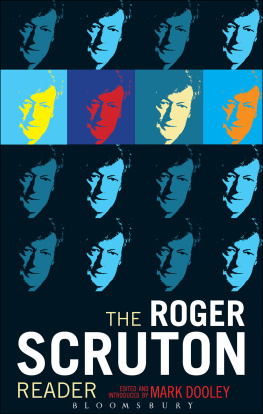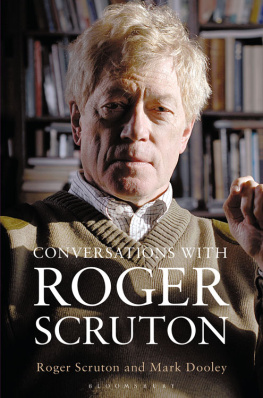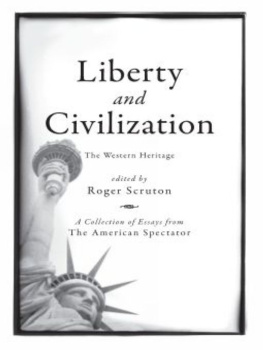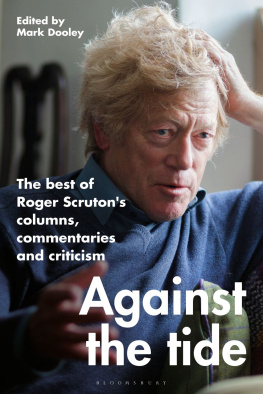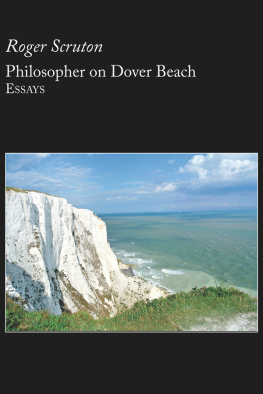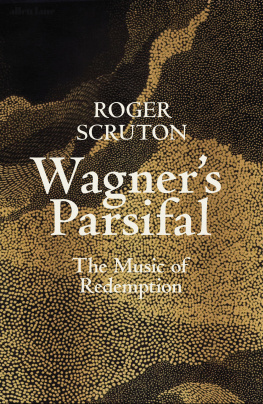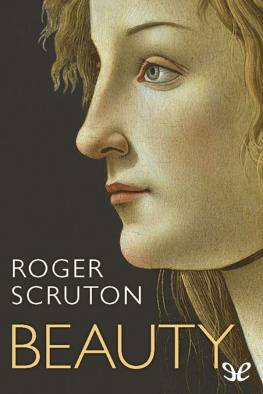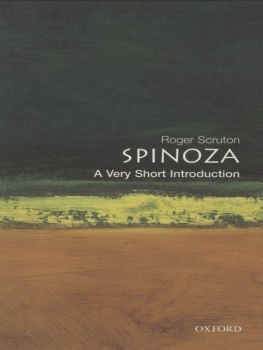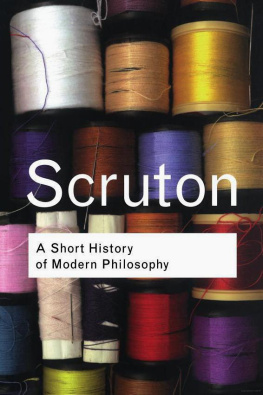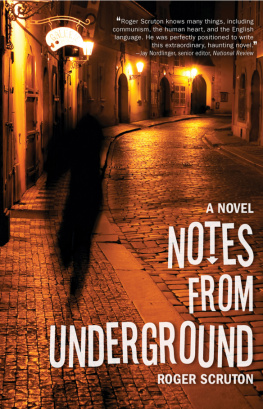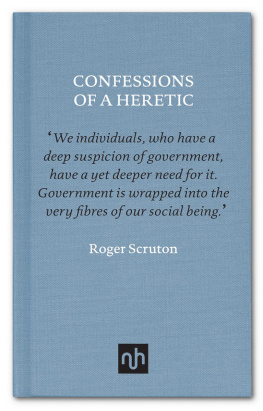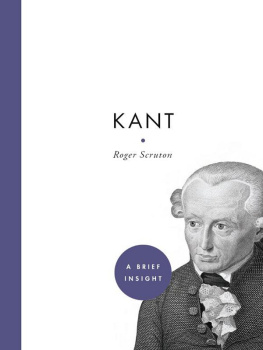Mark Dooley - The Roger Scruton Reader
Here you can read online Mark Dooley - The Roger Scruton Reader full text of the book (entire story) in english for free. Download pdf and epub, get meaning, cover and reviews about this ebook. publisher: Bloomsbury Publishing, genre: Romance novel. Description of the work, (preface) as well as reviews are available. Best literature library LitArk.com created for fans of good reading and offers a wide selection of genres:
Romance novel
Science fiction
Adventure
Detective
Science
History
Home and family
Prose
Art
Politics
Computer
Non-fiction
Religion
Business
Children
Humor
Choose a favorite category and find really read worthwhile books. Enjoy immersion in the world of imagination, feel the emotions of the characters or learn something new for yourself, make an fascinating discovery.
- Book:The Roger Scruton Reader
- Author:
- Publisher:Bloomsbury Publishing
- Genre:
- Rating:3 / 5
- Favourites:Add to favourites
- Your mark:
- 60
- 1
- 2
- 3
- 4
- 5
The Roger Scruton Reader: summary, description and annotation
We offer to read an annotation, description, summary or preface (depends on what the author of the book "The Roger Scruton Reader" wrote himself). If you haven't found the necessary information about the book — write in the comments, we will try to find it.
The Roger Scruton Reader — read online for free the complete book (whole text) full work
Below is the text of the book, divided by pages. System saving the place of the last page read, allows you to conveniently read the book "The Roger Scruton Reader" online for free, without having to search again every time where you left off. Put a bookmark, and you can go to the page where you finished reading at any time.
Font size:
Interval:
Bookmark:

Bloomsbury Academic
An imprint of Bloomsbury Publishing Plc
50 Bedford Square | 1385 Broadway |
London | New York |
WC1B 3DP | NY 10018 |
UK | USA |
www.bloomsbury.com
Bloomsbury is a registered trade mark of Bloomsbury Publishing Plc
First published 2009
Mark Dooley, 2009
Mark Dooley has asserted his right under the Copyright,
Designs and Patents Act, 1988, to be identified as Author of this work.
All rights reserved. No part of this publication may be reproduced or transmitted in any form or by any means, electronic or mechanical, including photocopying, recording, or any information storage or retrieval system, without prior permission in writing from the publishers.
No responsibility for loss caused to any individual or organization acting on or refraining from action as a result of the material in this publication can be accepted by Bloomsbury or the author.
British Library Cataloguing-in-Publication Data
A catalogue record for this book is available from the British Library.
ISBN: HB: 978-0-8264-2049-7
PB: 978-1-4411-1538-6
ePUB: 978-1-4411-7029-3
ePDF: 978-1-4411-2730-3
Library of Congress Cataloging-in-Publication Data
A catalog record for this book is available from the Library of Congress
In Memoriam
Professor John Cleary (19492009)
Roger Scruton produced his first book in 1974. Since then he has become a publishing sensation: 40 books, hundreds of scholarly articles, and scores of magazine and newspaper columns. He has written two operas, two novels and a book of poetry. Few can rival his prodigious output, his clarity of expression and the profundity of his thoughts. And yet, even now, at the age of 65, Scruton remains one of the most misunderstood and misrepresented figures in British intellectual life. Why that is so is something which I deal with in my book Roger Scruton: The Philosopher on Dover Beach . In that context, I suggested that Scrutons diverse writings on philosophy, religion, culture, architecture, sex, politics, hunting and wine are united by a single theme: the love of home . Throughout his long career, Scruton has been vilified by the Left as a conservative reactionary, whose views are no less dangerous than those of the British National Party. It is, however, quite obvious to anyone who has taken the time to read them that his writings are far from the deranged delusions of those on the extreme Right. For what fundamentally distinguishes Scruton from such people is that they are narrow nationalists, whereas his is a gentle and dignified patriotism.
In his most recent book of political thought, A Political Philosophy , he contrasts nationalism and patriotism in the following terms:
Left-liberal writers, in their reluctance to adopt the nation as a social aspiration or a political goal, sometimes distinguish nationalism from patriotism an ancient virtue extolled by the Romans and by those like Machiavelli who first made the intellectual case for modern secular jurisdiction. Patriotism, they argue, is the loyalty of citizens, and the foundation of republican government; nationalism is a shared hostility to the stranger, the intruder, the person who belongs outside. I feel some sympathy for that approach. Properly understood, however, the republican patriotism defended by Machiavelli, Montesquieu and Mill is a form of national loyalty: not a pathological form like nationalism, but a natural love of country, countrymen and the culture that unites them. Patriots are attached to the people and the territory that is theirs by right ,and patriotism involves an attempt to transcribe that right into impartial government and a rule of law. This underlying territorial right is implied in the very word the patria being the fatherland, the place where you and I belong and to which we return, if only in thought, at the end of all our wanderings.
In defiance of those thinkers who have sought to repudiate the patria in favour of nothingness and nowhere, Roger Scruton strives to provide his readers with a sense of somewhere . If radicals prefer global ideas to local loyalties, Scruton searches instead for a lost experience of home an experience which every left-wing movement from the social contract theory of Jean-Jacques Rousseau to the deconstruction of Jacques Derrida attempts to undermine. Restoring that old sense of home, of the patria , of a concrete place in which we can settle and have our identity objectively endorsed, is what primarily motivates Scruton politically and philosophically. Hence, his constant appeals on behalf of art, culture and beauty those things through which we identify a particular place as ours . The culture of a territory is what renders it enchanting and provides for those who dwell there a common source of loyalty and membership. In the course of memorializing his beloved England, Scruton explains:
When human beings cease their wanderings and mark out a place as their own, their first instinct is to furnish it with things which have no function ornaments, pictures, knick-knacks or with things which, while possessing a function, are valued for other reasons: for their associations, their beauty, their way of fitting in. Their instinct for the purposeless has a purpose namely to make these objects into an expression of ourselves and our common dwelling place, to endow them with the marks of order, legitimacy and peaceful possession. In other words, objects, when they form part of the home, are endowed with a soul... The enchantment of things in the home is part of a larger spiritual project. Home has its customs, its rituals, its special times and places. Or if it does not, it is so much the less a home, so much the less a place to look back upon in adulthood, when anger and rejection have intervened. A kind of authority attaches to the way things are done at home, and to the roles of mother and father as they divide the labour between them. We take this experience of authority with us into later life, and the images of father, mother and the rituals that haloed them shape our subsequent emotions.
Culture is what binds us together, and it is that through which we develop our loves and our deepest longings. In deconstructing it, therefore, the high priests of postmodernism and the legionnaires of liberalism reveal their underlying political agenda, which is to unsettle the old routines and settled ways of traditional society. It is to put alienation in the place of affection and liberation in that of lasting attachments. That is why Scruton follows Edmund Burke in making the passage from aesthetics to conservative politics with no sense of intellectual incongruity. Both are ways of recovering what has been wantonly wasted by those like Michel Foucault who strive to unmask the prevailing political order, believing it to be a citadel of power, a prison from which we must be emancipated. Aesthetics and conservative politics contain what Scruton calls social knowledge, or as he explains in his classic discourse on The Meaning of Conservatism :
By social knowledge I mean the kind of knowledge embodied in the common law, in parliamentary procedures, in manners, costume and social convention, and also in morality. Such knowledge arises by an invisible hand from the open-ended business of society, from problems which have been confronted and solved, from agreements which have been perpetuated by custom, from conventions which coordinate our otherwise conflicting passions, and from the unending process of negotiation and compromise whereby we quieten the dogs of war.
Font size:
Interval:
Bookmark:
Similar books «The Roger Scruton Reader»
Look at similar books to The Roger Scruton Reader. We have selected literature similar in name and meaning in the hope of providing readers with more options to find new, interesting, not yet read works.
Discussion, reviews of the book The Roger Scruton Reader and just readers' own opinions. Leave your comments, write what you think about the work, its meaning or the main characters. Specify what exactly you liked and what you didn't like, and why you think so.

